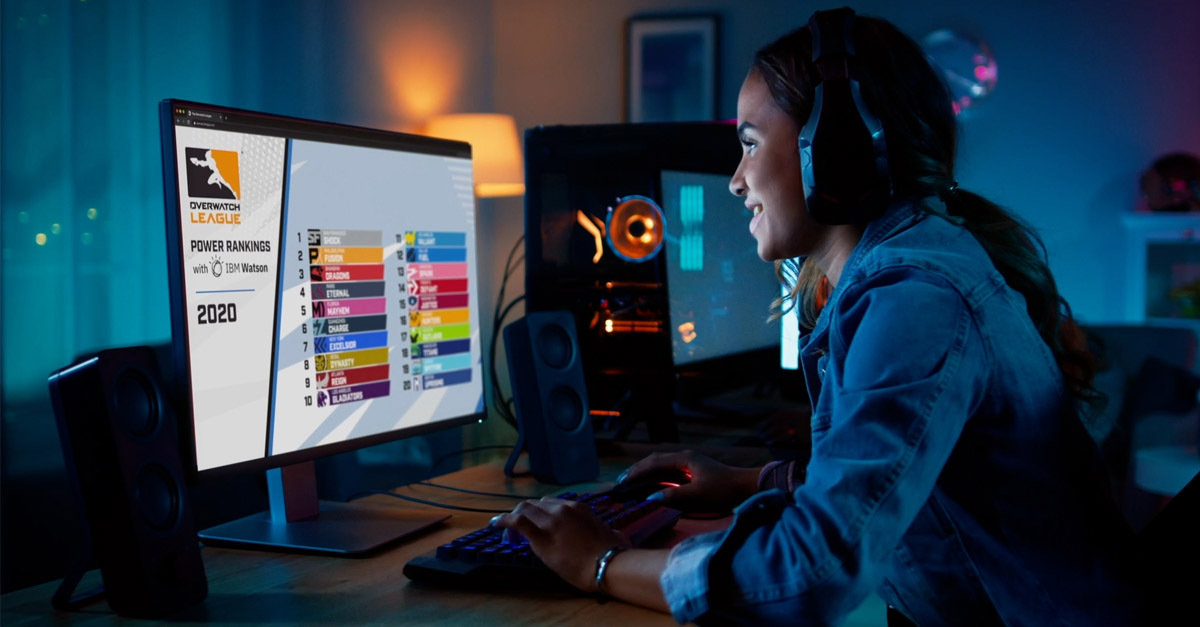IBM and Overwatch League
Blog: IBM, the Overwatch League, and the power of AI to solve complex data problems
 |
By Corey Shelton
April 13, 2021
One of the things I love about working at IBM is the opportunity to solve truly unique problems. And that was certainly the case when Blizzard Entertainment asked my team to develop new solutions for the Overwatch League. The League wanted us to leverage the power of IBM Watson to make the game more engaging for players, fans and broadcasters of the wildly popular esports game.
Overwatch is a team-based first-person action game that I’ve been playing for years. It’s fast-paced, complex, and requires a mix of skills and capabilities from each of the six players (and their chosen heroes) on a team. The Overwatch League is an international esports property built around playing the game, with 20 professional teams based in cities around the world, from Los Angeles to London to Shanghai.

This is a serious operation, similar to other professional sports leagues, with millions of fans around the world, corporate sponsors, and endorsement deals for the teams and players. But, because each game generates a tremendous volume and variety of data, the Overwatch League struggled to objectively assess the performance of players and teams. How could the League compare player A to player B – or to player B, C and D when each player is playing a unique hero in a different game mode on a different map?
“We’ve got really talented analysts that follow our players and teams, but there is so much happening in these matches, no human being could possibly observe and evaluate it all,” said Jon Spector, Vice President of Overwatch Esports at Blizzard. “We needed a way to capture and analyze every move from every player and feed all that insight into a ranking system that was totally objective and reliable.”
Introducing, Power Rankings with Watson, an objective, AI-based approach to evaluate the performance of players and teams in the wildly popular Overwatch League. The benefits of Power Rankings with Watson are two-fold. First, it gives owners, coaches and players a way to assess talent, which is critical for a game with millions in prize money on the line. But more importantly, it gives fans a quick and easy way to engage with the game, and with each other. As Jon says, “This is a great source of conversation for our fans and our broadcasters. And Overwatch League fans love debating stuff like ‘who is the best main tank in the world?’ The Power Rankings make that conversation richer and more fun.”

After our partnership was announced in October, the team wanted to move quickly to bring these solutions to life. To develop the Power Rankings with Watson, IBM pulled a team of experts from all over the world, including data scientists, AI specialists, and software developers to work together through IBM’s Area 631 program. Because the Overwatch League wanted the solution delivered before the start of the 2021 season on April 16, the team used an aggressive methodology to accelerate development. Area 631 is an internal IBM incubator program, that started in Canada based on the IBM Garage Methodology and now operates at our development labs worldwide. The program gives 6 experts 3 months to deliver 1 solution (hence the name, 631). The IBM team worked closely with the Overwatch League throughout the process, and in the end, developed the solution in only two months.
“We played a lot of Overwatch. We pulled a ton of data. And, because we were having fun while working, we worked very hard and made fast progress,” Stephane Rodet, the lead UX engineer on the project told me. “But it just goes to show that when you put the right people together with the right technology, you can solve even the most difficult problems.”
The team took three critical steps to attack the problem.
First, it focused on the statistics. The Overwatch League measures more than 360 different performance-based metrics from every match: everything from “healing per second” to “weapon accuracy” to “ultimate generation rate.” Having trust and transparency in your data is critical. So, the IBM team used IBM Cloud Pak for Data to aggregate, organize, and prepare this enormous volume of data for analysis.
Next, they used advanced analytics to determine the correlations between each statistic and match outcomes. In other words, they discovered how the various performance metrics contribute to wins and losses.
And finally, because not all statistics are created equal, the team used IBM Watson Studio’s machine learning and AutoAI capabilities to assign each statistic a weighting. Though all the statistics factor into the Power Rankings, about 30 of them are heavily weighted, driving the majority of moves within the rankings.
AutoAI was really the key to breaking through. It basically simplifies the process of building an AI model. It’s a machine learning capability that doesn’t require a Ph.D. in data science to use and provides transparency to help improve trust in models. A user essentially asks AutoAI to solve for specific variables. In this case, we needed to know how to weigh and prioritize different statistics from the game. We already had all the data. All we needed to do was ask.
So why did IBM go through all this trouble to create a ranking system for an esports league? Here’s what my colleague Noah Syken, Vice President of IBM Sports and Entertainment Partnerships, says about it: “It’s a powerful demonstration of what’s possible with data and AI today. We’ve used many of the same technologies to drive digital transformation at banks or airlines or retailers for years. But now millions of Overwatch League fans are going to see what IBM Watson can do. Gaming and Esports are the future of entertainment and we’re proud to be adding best-in-class analytics to enrich the fan experience.”
The Power Rankings with Watson will be produced every week and published on overwatchleague.com and ibm.com/overwatch when the season begins on April 16th. I can’t wait until the games begin, and I can’t wait for fans to get their hands on them. To all of my fellow gamers out there, glhf.

Corey Shelton
Digital Strategist